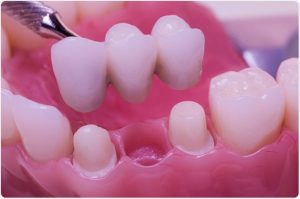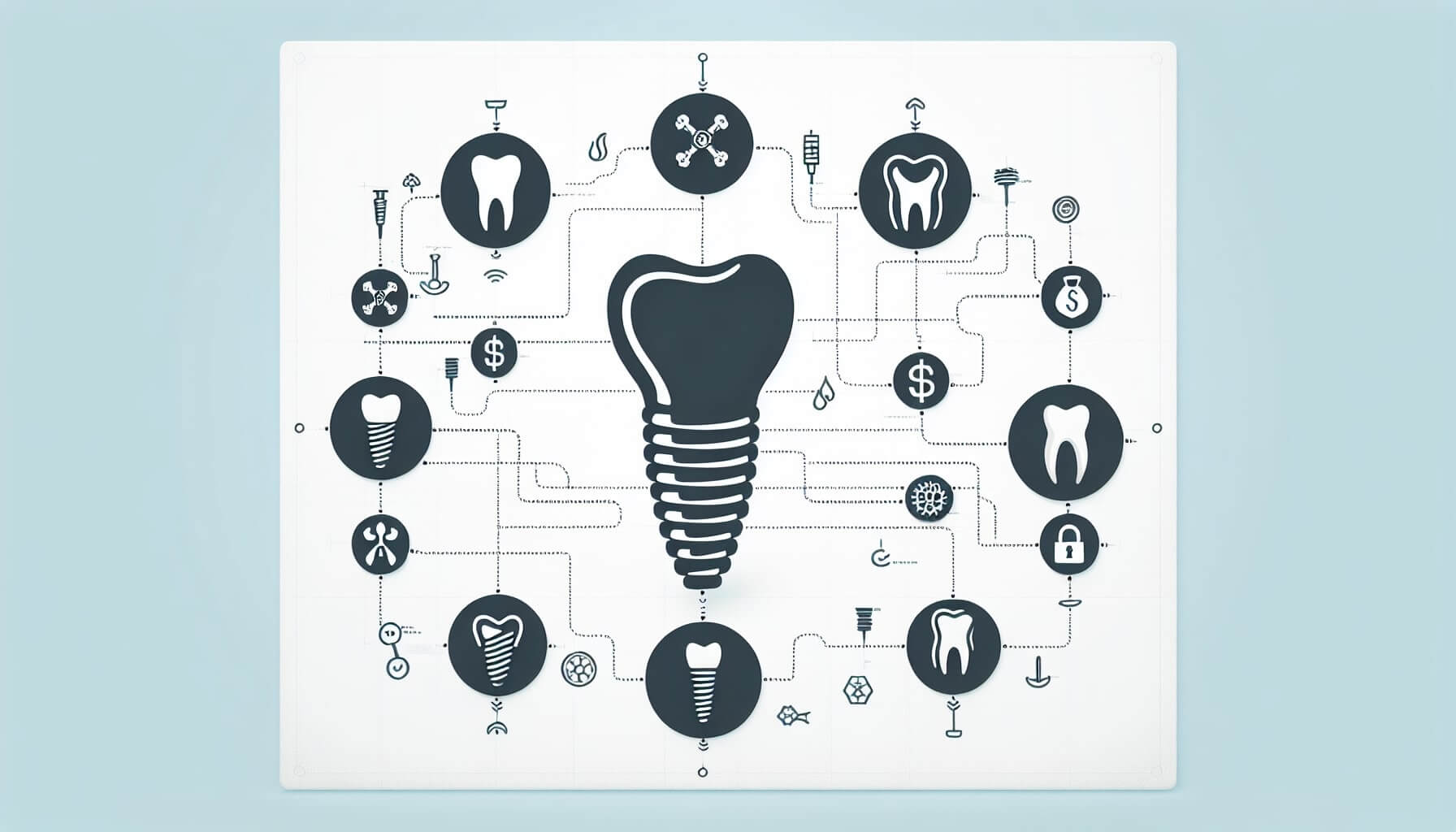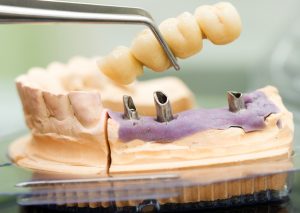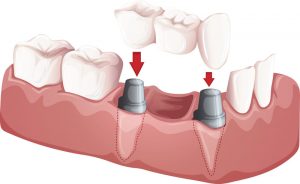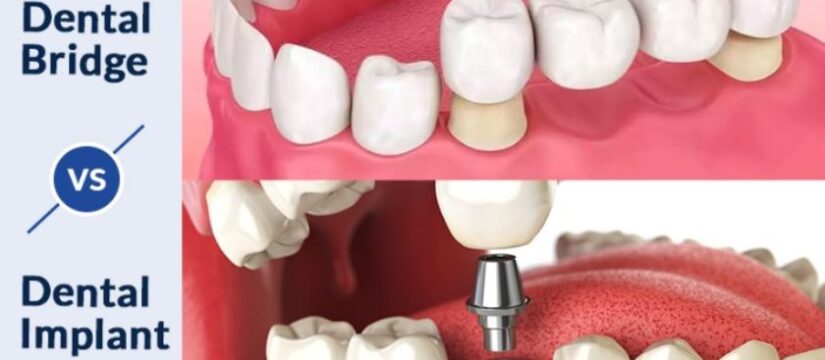
A bright, beautiful smile can light up a room, but missing teeth can cast a shadow on that radiance. Fortunately, dental science offers solutions: dental bridges and implants. The next sections will guide you through what they are, their bridge vs implant cost, the factors affecting those costs, their longevity, maintenance requirements, and the pros and cons of each.
Key Takeaways
- Comprehensive comparison of dental investment options: bridges and implants.
- Costs vary based on materials, complexity, location & supplementary treatments.
- Consider cost vs longevity/aesthetic appeal when deciding between bridge or implant. Consult a professional for best decision making process.
Understanding Dental Bridges and Implants
Dental bridges and implants, both designed to replace missing teeth, differ significantly in their structure and procedure. A dental bridge consists of dental crowns and a prosthetic tooth that fill in spaces created by missing teeth, like a bridge over a river fills the gap between two shores. On the other hand, dental implants provide a firm means of affixing a bridge to the jaw bone.
While dental bridges are more cost-effective initially, dental implants offer a more long-term solution. One of the key differences between the two is that bridges require the alteration of at least two neighboring teeth, while implants allow for the preservation of adjacent teeth. For those considering dental implants Rockville MD, implants can be an excellent option for restoring your smile and maintaining oral health.
The procedure for each also differs. A typical 6-unit canine-to-canine bridge requires 2-3 visits over a few weeks, whereas a dental implant procedure may take 2-4 months. The average cost of a bridge is approximately $6,000.
Factors Affecting Bridge and Implant Costs
The cost of dental bridges and implants can be influenced by several factors, starting with the materials used. Dental bridges can be constructed from:
- Gold
- Alloys
- Ceramics like zirconia and porcelain
- Special alloys
The material chosen can significantly impact the cost of the bridge, with gold and alloys being more expensive options.
The complexity of the procedure also affects the cost. More intricate procedures may require additional time and expertise, leading to higher costs.
Finally, the location and any supplementary treatments can also influence the cost. If the procedure is conducted in an area with a higher cost of living, the cost may be higher. Additionally, if any additional treatments are needed, such as bone grafts or sinus lifts, or if the patient has gum disease, the cost may increase.
Dental Bridge Cost Breakdown
The cost of a dental bridge can range significantly depending on the type, materials, and location. Traditional bridges, also known as fixed dental bridges, typically cost between $1,500 and $6,300, while implant-supported bridges can cost up to $15,000. To get a better understanding of dental bridges cost, it’s important to consult with a dental professional.
For example, a 6-unit canine-to-canine bridge’s cost is influenced by:
- the materials used
- the dental professional’s expertise
- the location of the dental practice
- any additional procedures or treatments required.
However, it’s worth noting that payment plans are available, depending on the type and complexity of the procedure. Accepted payment plans include CareCredit, Wells Fargo, and Proceed Financial.
Dental Implant Cost Breakdown
Dental implant costs typically exceed those of bridges. The starting price for an implant is around $1,500 per tooth, with additional fees based on treatments such as bone grafting.
The factors that can impact the cost of dental implants include:
- The number of implants required
- The type of implant material
- The type of restoration
- The bone density and quality
- The location of the dental practice
If a bone graft is suggested to provide support for the implant, this can also increase the overall cost of the procedure.
Insurance Coverage for Bridges and Implants
Dental insurance may cover a portion of the costs for both bridges and implants. However, the amount of coverage can vary significantly depending on the plan and provider.
Keep in mind that insurance often requires consistent and upfront payments. You need to meet your deductible as well as pay monthly premiums, and further may face annual fees..
Dental insurance may also provide a discount or make a contribution towards the cost of dental treatment, such as restorative treatment with a fixed dental bridge.
Longevity and Durability: Bridge vs Implant
When it comes to longevity and durability, dental implants typically outlast dental bridges. Bridges usually have a lifespan of 10-15 years, while implants can last 20 years or more with proper maintenance.
This long lifespan makes implants a more cost-effective option in the long run, despite their higher initial cost. However, it’s worth noting that the longevity of both bridges and implants can be influenced by factors like oral hygiene and regular dental check-ups.
Maintenance and Oral Hygiene Requirements
Proper care of your dental bridge or implant is key to its durability. Dental bridges require special cleaning techniques and tools, including:
- Floss threaders
- Toothpicks
- Interdental brushes
- Super floss
- Dental picks
- Waterpik
Meanwhile, dental implants, which serve as artificial teeth, can be cared for much like natural teeth. Regular brushing, flossing, and dental check-ups are essential for maintaining the health of dental implants.
Without proper maintenance, issues such as infection, tooth decay, improper fit, damage, and fracture could arise with both bridges and implants.
Pros and Cons of Choosing a Bridge or Implant
Choosing between a bridge or an implant depends on various factors. Bridges are more cost-effective initially, making them a popular choice for those looking for a more affordable option upfront. However, potential issues that may arise with dental bridges include infection, decay, improper fit, damage, and fracture.
On the other hand, while dental implants are more expensive initially, they offer a more permanent solution. They have a longer lifespan, often lasting up to 15 years or more, and provide a natural-looking aesthetic, as well as a strong and secure bond with the jawbone.
Consultation and Decision-Making Process
Seeking advice from a dental professional is significant when deciding between a dental bridge and an implant. They can guide you through the factors that should be considered when making this decision, such as:
- personal preferences
- the necessity for surgery
- cost-efficiency
- the location of the missing tooth relative to adjacent teeth.
Getting ready for a dental implant or dental bridge procedure involves:
- Setting up an appointment with your dentist or oral surgeon
- Assembling pertinent dental records or X-rays
- Preparing queries or concerns to discuss
- Sharing your dental history
- Expressing your expectations and objectives for the treatment
- Adhering to any pre-consultation guidelines given by your dentist or oral surgeon.
The timeline for selecting between a dental implant and a dental bridge can vary depending on the individual’s circumstances and preferences. Factors to consider include:
- The number of missing teeth
- Treatment process
- Longevity and durability
- Cost
- Convenience
- The need for surgery
It is advisable to consult with a dental professional to make a well-informed decision.
Summary
Dental bridges and implants offer effective solutions for missing teeth. While bridges are more affordable upfront, implants offer a more permanent solution and tend to last longer. Both have specific maintenance and oral hygiene requirements, and the choice between them should be made after consulting with a dental professional and considering factors like cost, insurance coverage, and long-term benefits. In the end, the choice between a bridge or an implant should be based on your individual needs, preferences, and budget.
Frequently Asked Questions
Is it better to get an implant or a bridge?
Implants are a better choice than bridges when considering functionality and aesthetics. Keep this in mind and go for the option that best meets your needs.
Why is a doctor prefer bridge over implant?
A bridge is a preferable choice for replacing missing teeth when the neighboring teeth have drifted or tilted, as it helps reshape them while also replacing the missing tooth, and an implant would require additional orthodontic work to make space.
Which lasts longer a bridge or an implant?
Dental implants are the clear winner when it comes to longevity, as they can last up to 40 years or more compared to 10-20 years for bridges.
How many teeth can be on an implant bridge?
An implant bridge can replace up to four teeth, although one to two is more common. In rare cases, a bridge can replace more than four teeth.
What is the difference between a dental bridge and an implant?
A dental bridge involves affixing artificial teeth to crowns that bridge the space created by missing teeth, while a dental implant is a metal post that is placed in the jawbone and then used to secure a bridge.


